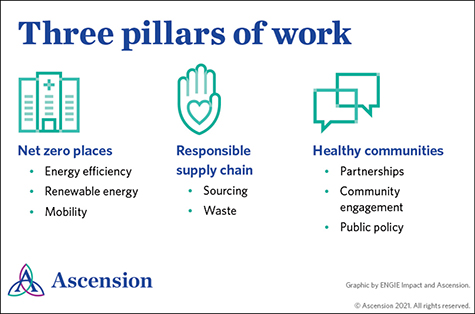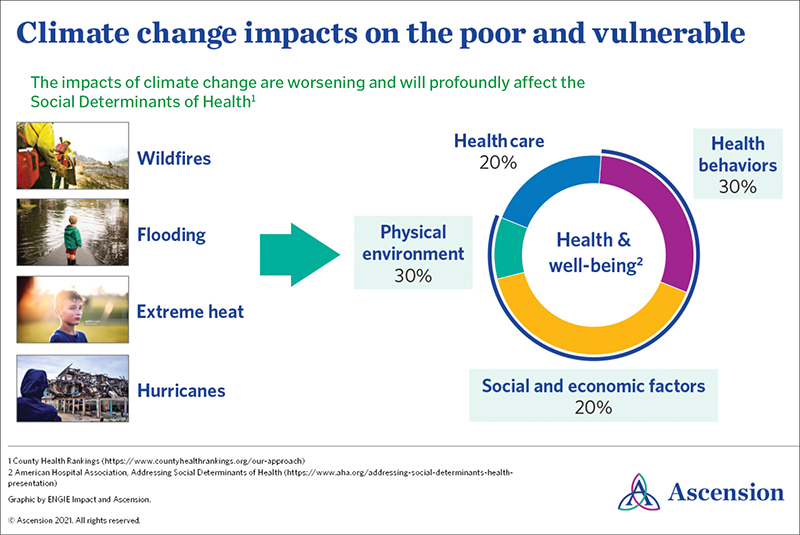CRAIG CORDOLA, MBA, MHA, FACHE
Executive Vice President, Chief Operating Officer, Ascension
Many of us have found ourselves at the intersection of health care and the environment. For me, one of the most impactful moments took place earlier in my career, serving in the aftermath of Hurricanes Katrina and Rita. I will forever remember sitting at our transfer center in Houston around midnight, watching our helicopters, fixed-wing aircraft and ambulances set out for New Orleans to help evacuate people to our city. In the days to come, busloads of people arrived at the Astrodome and the convention center, where we were providing care. They came with nothing other than what they could carry — totally displaced from family members, dropped off in an unfamiliar city. It impressed on me that when the fabric of a community breaks down following a natural disaster, you really don't have normal infrastructure and processes. Things like security, safety, food, access and relationships get stripped away. Katrina left both cities forever changed. All because of a natural disaster, exacerbated by climate change.
As I reflect on Katrina and Rita, and the countless wildfires, floods and extreme heat events that have happened since, I am struck by the immediate and lasting impact these events have on individuals and communities, especially for those people who are poor and vulnerable.
Health care's impact on the environment is significant and inextricably linked to the health of the communities and patients we serve. Compelled by our mission to sustain and improve the health of individuals and communities, it is our time to respond in a new way.
We have recently challenged our health ministry to take a greater role in leading transformation around environmental impact and sustainability.
We have asked ourselves: What if there was a way to change health care as it relates to environmental impact and sustainability so that it has a profound effect on our coworkers, our patients and the communities that we serve? How does this work integrate into our ministry to bring about meaningful, sustainable change over time? How can we harness the power of 160,000 employees and their families and all the people they impact to make a tangible difference to our patients and communities — and likely change health care as a whole?
As a health care ministry, rooted in our Catholic faith and social teaching, we believe it's an expectation and enormous opportunity for us to approach our work in a different way. Care for God's creation is one of the principles of Catholic social teaching and serves as a beacon for all of Catholic ministry to lead the way on environmental sustainability.

THREE PILLARS
To find answers to these complex challenges, Ascension recently developed a long-term environmental impact and sustainability program to augment our continued efforts around energy conservation, waste management, recycling, environmentally preferred purchasing and the use of renewable fuels. With guidance from executive and senior leaders, as well as internal and external subject matter experts, we developed the following purpose statement to guide our work:
"Ascension's commitment to reducing our environmental impact and achieving sustainability is rooted in our Mission, which calls us to be advocates for a compassionate and just society in our actions and our words. Through Catholic social teaching, we recognize the human dignity of all people and the common good as we work toward equitable access to resources to improve the community health and the lives of individuals we serve."
We will work across our ministry to set goals to improve our efficiency, resiliency and sustainability as we continue to provide the health care our communities need and future generations deserve.
The renewed focus is the result of a yearlong effort to develop a sustainability strategy that will maximize environmental impact for decades. This program will focus activities in the following three pillars:
NET ZERO PLACES
This work is focused on carbon sources associated with our physical environments — energy management, water management and mobility, both moving within those environments and getting to and from them. This pillar considers the carbon footprint and operational efficiency of our facilities as well as sustainable transportation.
Objectives: Ascension seeks to create and support a resource-efficient, cost-effective and resilient ecosystem of our facilities and real estate with minimized impact to the environment and maximized care to patients and associates.
The goal: Net zero carbon with absolute emissions reduction by 2040.
RESPONSIBLE SUPPLY CHAIN
This work is focused on the flow of goods, from procurement through their disposition after use. These responsible supply chain efforts address responsible purchasing — to ensure we buy only what we need — as well as sourcing and waste management. Together, these efforts will lower environmental impact and provide social good.
Objectives: Ascension seeks to create and support a cost-effective, healthy, circular and resilient value chain that accelerates change toward a value-based care model, in alignment with our commitment to holistic care for the person and the common good as well as to Catholic social teaching. We have a tremendous opportunity to change our work in supply chain management on what comes in and out of our facilities as well as the impact on the footprint that we leave behind.
The goal: Recycle 50% of nonhazardous waste from all managed facilities by 2030; zero waste by 2040.

HEALTHY COMMUNITIES
Most of our work to this point has focused on realizing energy savings and thinking differently about how we acquire and run our facilities. But the heart of our environmental impact and sustainability program is our efforts toward healthy communities.
Objectives: We are examining our communities and social determinants of health as well as designing programs and processes that support clinical interventions to address environmental effects on patients and create healthier environments in communities we serve.
The goal: We will work closely with the individuals and communities most impacted by climate change to improve their lives and livelihood. Other intended outcomes include safer, healthier communities, improved patient comfort and improved patient safety (see graphic above).
EARLY SUCCESS STORIES
We are taking a fresh look at Ascension's sustainability initiatives to expand and enhance our ability to infuse greener thinking across the organization, including acute care and ambulatory facilities as well as administrative and office settings. These initiatives continue work that has been underway for more than 15 years. The early successes described below highlight ongoing commitment and pave the way for the goals we have set for the future.
Green Teams
Ascension's environmental sustainability efforts have largely rested on the contributions of our Green Teams, employees at each facility who are interested in mitigating the local impact of their facility on the environment. Green Teams also report on energy, water and waste management for their facility or market. We'll continue to weave environmental principles into everything we do through these interdisciplinary teams.
There is also an inherent link between these Green Teams and our Catholic identity. Ascension uses a Catholic Identity Matrix (CIM) to assess and enhance the degree to which our markets integrate Catholic moral principles within our operating policies, processes and practices. One of the six principles included in the CIM involves environmental sustainability. Green Teams extend this mission-oriented principle more fully. Through these teams, associates are encouraged to participate in Earth Day and Feast of Saint Francis events as well as volunteer at community
gardens, help with recycling events, plant trees and more.
Better Buildings Challenge
During the recession of 2008, the need to reduce costs motivated Ascension to track energy use as the first environmental sustainability metric to be monitored at the system level. After meeting an initial goal of reducing energy use by 5% in 2011, Ascension committed to a 20% reduction in energy use by 2020 as part of the U.S. Department of Energy's Better Buildings Challenge.
From mid-2008 through 2016, Ascension reduced energy usage by 21.4%, achieved $53.3 million in cost avoidance and avoided over 1,114,600 tons of carbon dioxide emissions across 141 health care facilities. As hospitals realized the value of improved energy efficiency, they asked about additional related strategies, such as recycling programs, safer chemicals and environmentally preferred purchasing.
Waste Diversion
The Resource Group, Ascension's group purchasing organization, has led the way to reprocess and recycle single-use devices (SUDs). This initiative cuts down on waste sent to landfills and reduces expenses. SUDs are now collected and sent to reprocessing centers to be cleaned, recalibrated, repackaged and resterilized for multiple uses.
Along with the benefits of reprocessing, Ascension also recycles SUDs that have been used by providers the maximum number of times allowed by the U.S. Food and Drug Administration. These devices can be reprocessed anywhere from one to 10 times. Once a device has run its course, rather than throwing it away, our ministries now focus on recycling these items. In the 2020 fiscal year, Ascension hospitals collected 1.4 million devices, resulting in $19 million in savings and 700,000 pounds of waste diverted from landfills. Since the program's inception in FY13, 4.5 million pounds of waste has been diverted.
Antibiotic-free Food
Through a collaboration with the Health Care Climate Council, the Healthcare Anchor Network and Practice Greenhealth, Ascension has participated in market transformation groups. The first group initiative was called "Less Meat, Better Meat." We worked closely with our food and nutrition services partner as well as our infection control team to advocate buying poultry raised without the use of antibiotics. Through collaboration and work to change the markets, we helped ensure that such food became available.
THE IMPORTANT HAS BECOME THE URGENT
As we look at what lies ahead, we are convinced that care of God's creation is not only important; it is an urgent matter that demands immediate attention. When I think about my children and future generations, our employees and the patients and communities we serve, I realize how the work of environmental sustainability cannot wait. Wildfires and floods, hurricanes and extreme heat will increasingly affect our health — further compounded by social determinants impacting those who are poor and vulnerable.
Now is the time to reimagine what environmental impact and sustainability could look like for the next decade and beyond. We encourage other Catholic health care leaders to join us as, to paraphrase Pope Francis in Laudato Si', we strike out on new paths and meet the needs of the present with concern for all and without prejudice toward coming generations. Together, we will make a difference.
CRAIG CORDOLA serves as executive vice president and chief operating officer for Ascension, St. Louis.
In his encyclical Laudato Si', Pope Francis made a plea for leaders who would create the culture needed to confront this important work:
"Never have we so hurt and mistreated our common home as we have in the last 200 years. Yet we are called to be instruments of God our Father, so that our planet might be what he desired when he created it and correspond with his plan for peace, beauty and fullness. The problem is that we still lack the culture to confront this crisis. We lack leadership capable of striking out on new paths and meeting the needs of the present with concern for all and without prejudice toward coming generations." (Paragraph 53)